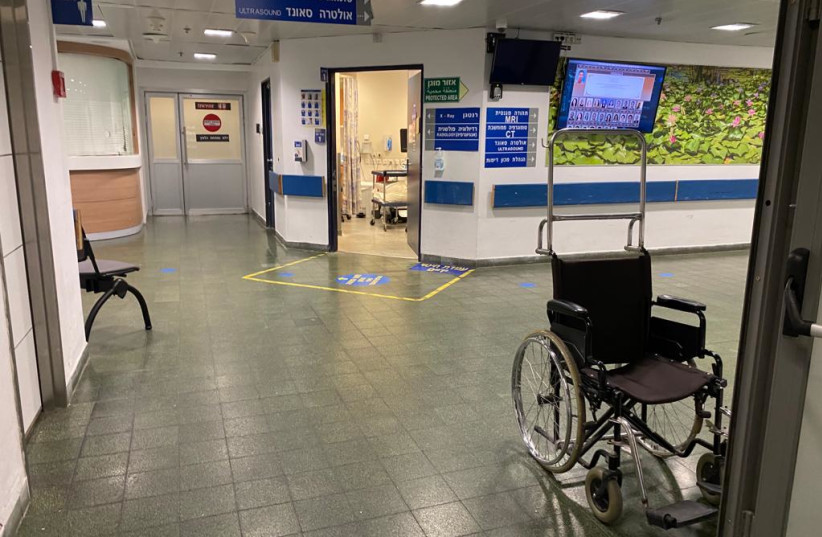The Israel Medical Association called a two-day strike in hospitals and clinics throughout the country that ended today. The strike was held in protest of recent violence against medical personnel after a male patient beat up a female doctor at a Clalit clinic in Be’er Yaakov. We fully support the IMA’s appeal to the government to expedite the implementation of its new plan to halt attacks on health providers, but this is not enough. As IMA chairman Prof. Zion Hagai said, much more must be done.
“In the past year, we have made it unequivocally clear that any case of violence will be met with zero tolerance on our part,” said Hagai. “As long as we do not see real actions in the immediate term, we will intensify the steps until someone here wakes up and understands that violence in the health system is a real epidemic.”
After the latest incident of violence, police arrested a Be’er Yaakov resident in his 30s suspected of seriously injuring the doctor, who was taken to Sheba Medical Center for treatment. The assailant is said to have arrived at the clinic to receive medical treatment and started behaving wildly. After refusing the doctor’s request to leave, the assailant struck the doctor on her head with an object the KAN public broadcaster first reported was an iron bar. It was later found to be a meat tenderizer, a type of hammer.
“A doctor was busy and couldn’t see a patient, so he broke into a room with an iron bar and hit her repeatedly on the head and other parts of her body,” said Health Ministry Director-General Prof. Nachman Ash. Police said they plan to charge the suspect with attempted murder.

“Having police in hospitals will not solve everything either. It is impossible to put a police officer in every clinic – that is clear. I believe that punishment is the key to creating deterrence."
Health Ministry Director-General Prof. Nachman Ash
“We are shocked by the case of severe violence against the doctor,” Clalit said in a statement. “The teams provide dedicated care, and the cycle of violence must stop immediately. We will not accept a reality in which medical teams are exposed to severe violence every day. We demand that all relevant authorities join hands and act resolutely and without compromise to eradicate the phenomenon.”
Recent scourge of hospital violence
Tuesday’s attack was the latest in a series of violent incidents reported in hospitals and clinics in recent months. The IMA strike is, in fact, the second initiated by the union in recent weeks. The first was called last month after family members of a patient who died in the intensive care unit in Jerusalem’s Hadassah Medical Center at Mount Scopus attacked medical staff and caused severe damage to the ICU after they were informed of his death.
Another incident took place at Galilee Medical Center in Nahariya, during which staff were attacked by the family of a young man killed in a car accident. Hours after the protest, a doctor in the emergency room at Wolfson Hospital in Holon was attacked by a patient who assaulted him and broke his glasses.
Two weeks ago, a female patient at Emek Medical Center in Afula attacked a staff worker, broke a window and left. The hospital’s security personnel were called to the scene and summoned police, who arrested the young woman.
This incident occurred just a day after the government approved a plan for police units to be stationed at all hospitals across the country following numerous incidents of violence against staff at several medical centers. The police said the plan would be implemented by the end of the first quarter of 2023.
While Ash welcomed the plan, he said safeguarding staff at community clinics is a more difficult issue to tackle. “It really is a much bigger challenge,” he said. “Having police in hospitals will not solve everything either. It is impossible to put a police officer in every clinic – that is clear. I believe that punishment is the key to creating deterrence.”
Ash suggested that while violence against health providers is not new, in recent times it has grown in epidemic proportions and may be linked to the anti-vaccine discourse that became prevalent during the coronavirus pandemic.
Whatever the case, security must be stepped up at hospitals and clinics across Israel. Law-enforcement authorities should use a heavy hand against anyone who acts violently against medical staff. At the same time, hospitals and clinics should do all they can to reduce long waiting periods for patients. And finally, the courts must punish perpetrators to the fullest extent of the law.
